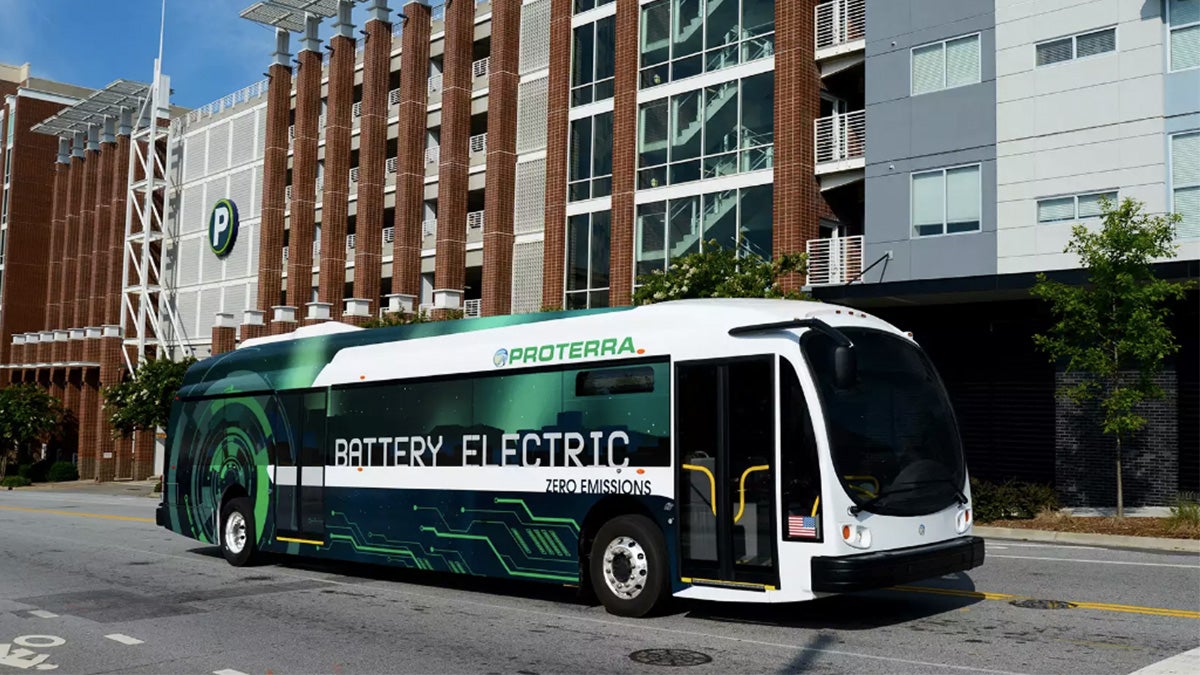Delaware reduces emissions with electric buses

Battery electric buses will run in Kent County by the end of next year. (courtesy of Proterra)
Delaware will use more than $2 million in federal money to purchase and run electric buses in an attempt to reduce emissions in the environment.
The Delaware Transit Corporation announced Monday it was awarded the Federal Transit Administration grant to purchase up to six zero-emission battery-electric buses.
“Being on the east coast on the northeast corridor Delaware is a non-attainment state for emissions and the environment,” DTC Chief Executive Officer John Sisson said.
“At Delaware Transit, for years we’ve been looking at ways to be environmental friendly, from putting solar panels on some of our buildings to doing electric hybrid buses. We want to be good stewards of the environment and do as much as we can to reduce emissions we produce by transporting people around the state.”
The FTA has encouraged transit agencies across the U.S. to embrace cleaner emission buses, such as electric, hydrogen and other options.
Delaware previously applied for a grant to fund hybrid electric buses—which are half diesel and half electric—but wasn’t successful. This year it applied for a grant to fund electric-only buses, and was awarded the more than $2 million grant.
Delaware already operates some electric hybrid buses, but this will be the first time Delaware will incorporate electric-only buses in its transit system.
Delaware will receive the funding July of next year, and in the meantime it will work on the infrastructure of charging stations, train individuals who will maintain the buses and work toward the purchase of the buses.
The buses will be purchased from Proterra, a company headquartered in California that designs and manufactures zero-emission battery-electric buses.
The company has buses in 38 cities, and they also have corporate customers. This week, one of its buses is featured at the Democratic National Convention in Philadelphia.
Ryan Popple, CEO of Proterra, said the vehicles are becoming high-demand, and his company has added 17 cities to its client base since the beginning of this year.
“I think it’s the most important vehicle trend in the U.S. transit industry, but it’s also a growing global trend,” Popple said.
He said the buses are just as capable as conventional city buses, but from a technology perspective they’re quite different. The shape of the vehicle is more aerodynamic, they’re made out of a light-weight advanced material and have no tail pipe, as they run entirely on battery electric, Popple said. However, it also has just as much horsepower as a diesel engine, he said.
“It’s a transit vehicle that can replace a typical city vehicle, but does it without any of the noise or fossil fuel emissions,” Popple said.
The most significant benefit of replacing diesel buses with electric buses is reducing emissions from the environment. Typical city buses require 10,000 gallons of diesel a year, Popple said. Over a 12-year period, a diesel bus needs one million pounds of diesel fuel, he said.
“You’re going to drop hundreds of millions of diesel consumption out of the urban environment and that’s a wonderful thing,” Popple said.
“Most people understand it’s a really bad thing for their parents or children to breath in air pollution you can literally see coming out of their tail pipes.”
U.S. Sen. Tom Carper, D-Delaware, said the new buses will create a healthier Delaware.
“This grant funding will do a lot of good to keep Delaware driving toward a clean-energy future,” he said in a statement. “Dirty old engines emit deadly toxins into our air, and we know that chronic exposure to those emissions can pose serious harm to our public health.”
A few years ago the electric buses cost more than $1 million, but a now the buses are in the $700,000 range, depending on the configuration. However, they will save Delaware thousands of dollars, according to the DTC.
Fuel savings could be $300,000 over a 12-year period, and the state also could save another $100,000 to $150,000 on maintenance. The lifetime fuel costs for electric buses will be $81,000, compared to $378,000 for diesel. Sisson said the DTC hopes savings will allow for more services on the street.
“Cutting edge technology, like the zero-emission battery-electric bus, is crucial to making our transportation system cleaner,” said Congressman John Carney, D-Delaware, in a statement. “These six buses will cut harmful emissions and save Delaware taxpayers hundreds of thousands of dollars a year in fuel costs.”
The buses also are quieter than diesel buses, with a reduction from 72 decibels to 57 decibels, Sisson said.
”We haven’t heard any complaints, but any time you’re running in a residential area quieter is better,” he said.
The buses will be placed into DART’s public transit service in Dover and surrounding Kent County, replacing the diesel buses. Kent County will be the first area to utilize the buses because the routes are shorter.
The DTC plans to recharge the buses every 20 or 30 miles, and charging will only take about five or 10 minutes.
Popple said Proterra also can build buses with the ability to drive a full day on a single charge, and beginning next year the vehicles will be able to handle almost any route.
DTC’s long-term plan includes expanding the operation of electric buses to the Rehoboth area, following the completion of the Lewes Transit Center, and to Wilmington.
Popple said he hopes to expand the technology to other markets, such as taxis, delivery trucks and school buses.
“A zero emission city is a possibility. It won’t happen overnight, but over the next 10 years we’ll realize it’s quite possible,” he said.
“When I think of what a city would be like 10 years from now…the city will smell better, it’s going to sound better, it will be a more habitable place for families with young children and for people with air quality concerns, like the elderly.”
U.S. Sen. Chris Coons, D-Delaware, said the buses are key to transforming the future of transportation in the state.
“This is welcome news for drivers, pedestrians and others who will share the roads with the new state-of-the-art buses,” U.S. Sen. Chris Coons, D-Delaware, said in a statement. “They are a great first step that will help DART begin to transform their bus fleet to no or low emission vehicles.”
WHYY is your source for fact-based, in-depth journalism and information. As a nonprofit organization, we rely on financial support from readers like you. Please give today.





